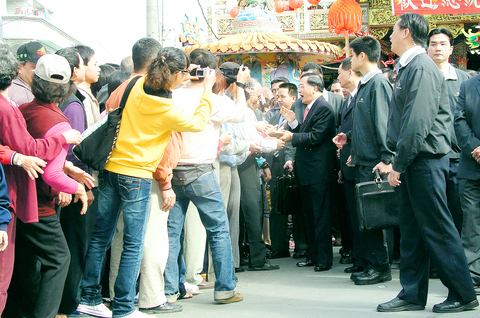Now is an appropriate time to seriously consider abolishing the National Unification Council and the Guidelines for National Unification in order to reflect the current state of Taiwanese consciousness, President Chen Shui-bian (陳水扁) said yesterday.
"What Chinese unification are we after?" Chen asked, describing the guidelines as "a store whose sign has disappeared and stocks gone."
"In addition to considering whether to abrogate the nominal Unification Council and guidelines, I'd like to see the nation join the United Nations with the name of Taiwan," Chen said.

PHOTO: CHANG CHUNG-YI, TAIPEI TIMES
"In addition, I'd like to see the draft of a new constitution completed by the end of the year so it can be put to a popular vote next year," he said.
Chen listed his three goals for the new year in the opening speech at a lunch banquet held by hundreds of his supporters at his alma mater of Matou Junior High School in Matou (麻豆) Township, Tainan County.
Chinese Nationalist Party (KMT) Chairman Ma Ying-jeou (馬英九) responded to Chen's comments by saying that the president had promised before his election and re-election that he would not abolish the council.
If the president now decided to abolish the council, his credibility would be questioned, Ma said.
The council was set up in 1991 by then-president Lee Teng-hui (
The guidelines set a goal to pursue a unified China that is governed by a democratic and free system with equitable distribution of wealth.
The guidelines also outline what positive steps both sides can take in the near, medium and long-term to ultimately achieve the goal of unification.
Chen also vowed to continue reform and urged the people to defend the nation's democracy and sovereignty.
"Most Taiwanese people hope to see the country pursue national dignity and enhance Taiwanese consciousness," he said.
"Both the Presidential Office and the new Cabinet will exert themselves to accomplish the goal in the new year," he said.
Meanwhile, a brawl outside president's family home in Chichuang (
Blows were exchanged as a dispute over who was first in line became heated.
Chen Chao-shou (陳朝壽) of Taipei County was the first person to receive the red envelope from Chen yesterday. He said that he had camped outside the president's home since arriving to stand in line about a week ago.
Hou Tai-an (
Hou and Chen Chao-shou got into a shoving match, which was stopped by national security officers. Hou later managed to punch Chen Chao-shou in the face after both received their red envelopes.
About 18,000 people had lined up to receive the red envelopes, which contained a NT$10 coin. They also received a CD entitled the Songs of Taiwan.
Chen Shui-bian and his wife, Wu Shu-chen (
The presidential tradition was begun by former president Lee Teng-hui (
Many stake out a spot in line days ahead of time by placing a stool or a chair in their place.
The amount of money in the envelopes was reduced from NT$200 to NT$10 in 2004 because of an anti-vote-buying law that limits gifts given by candidates to voters to no more than NT$30.

SECURITY: As China is ‘reshaping’ Hong Kong’s population, Taiwan must raise the eligibility threshold for applications from Hong Kongers, Chiu Chui-cheng said When Hong Kong and Macau citizens apply for residency in Taiwan, it would be under a new category that includes a “national security observation period,” Mainland Affairs Council (MAC) Minister Chiu Chui-cheng (邱垂正) said yesterday. President William Lai (賴清德) on March 13 announced 17 strategies to counter China’s aggression toward Taiwan, including incorporating national security considerations into the review process for residency applications from Hong Kong and Macau citizens. The situation in Hong Kong is constantly changing, Chiu said to media yesterday on the sidelines of the Taipei Technology Run hosted by the Taipei Neihu Technology Park Development Association. With

CARROT AND STICK: While unrelenting in its military threats, China attracted nearly 40,000 Taiwanese to over 400 business events last year Nearly 40,000 Taiwanese last year joined industry events in China, such as conferences and trade fairs, supported by the Chinese government, a study showed yesterday, as Beijing ramps up a charm offensive toward Taipei alongside military pressure. China has long taken a carrot-and-stick approach to Taiwan, threatening it with the prospect of military action while reaching out to those it believes are amenable to Beijing’s point of view. Taiwanese security officials are wary of what they see as Beijing’s influence campaigns to sway public opinion after Taipei and Beijing gradually resumed travel links halted by the COVID-19 pandemic, but the scale of

A US Marine Corps regiment equipped with Naval Strike Missiles (NSM) is set to participate in the upcoming Balikatan 25 exercise in the Luzon Strait, marking the system’s first-ever deployment in the Philippines. US and Philippine officials have separately confirmed that the Navy Marine Expeditionary Ship Interdiction System (NMESIS) — the mobile launch platform for the Naval Strike Missile — would take part in the joint exercise. The missiles are being deployed to “a strategic first island chain chokepoint” in the waters between Taiwan proper and the Philippines, US-based Naval News reported. “The Luzon Strait and Bashi Channel represent a critical access

Pope Francis is be laid to rest on Saturday after lying in state for three days in St Peter’s Basilica, where the faithful are expected to flock to pay their respects to history’s first Latin American pontiff. The cardinals met yesterday in the Vatican’s synod hall to chart the next steps before a conclave begins to choose Francis’ successor, as condolences poured in from around the world. According to current norms, the conclave must begin between May 5 and 10. The cardinals set the funeral for Saturday at 10am in St Peter’s Square, to be celebrated by the dean of the College